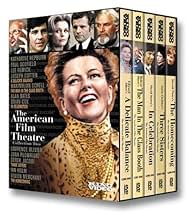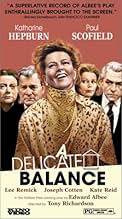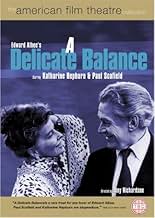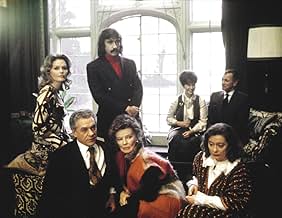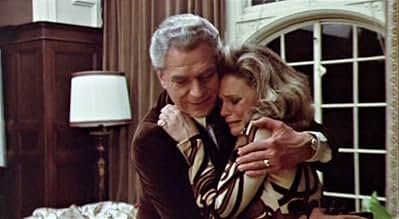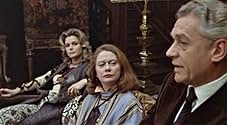A well-to-do Connecticut family is upended when the grown daughter's godparents, seized by a nameless terror, decide to come live with them.A well-to-do Connecticut family is upended when the grown daughter's godparents, seized by a nameless terror, decide to come live with them.A well-to-do Connecticut family is upended when the grown daughter's godparents, seized by a nameless terror, decide to come live with them.
- Director
- Writers
- Stars
- Awards
- 1 nomination total
- Director
- Writers
- All cast & crew
- Production, box office & more at IMDbPro
6.51K
1
2
3
4
5
6
7
8
9
10
Featured reviews
Fierce Females, Gentle Men
Director Tony Richardson's presentation of "A Delicate Balance" could be dismissed for it's lack of edginess and it's gentrified (albeit screwed up) characters. It is also what critics would call a "stagy" film. Yet it is redeemed from this dour damnation because of Albee's wonderful way with words, the rich cinematography, and exceptional acting, exceptionally well cast: Katherine Hepburn, Paul Scofield, Lee Remick, Joseph Cotton.
For those looking for a violent film -- not in the form of bullets or explosions -- but of verbal surgical strikes, this is it. Edward Albee's dialogue provides all the female (yes, this would be considered a "woman's movie") protagonists and antagonists (one wonders at times which is which) a laser like aim against their primary targets: other women. And it is done under a guise of "civility"; sometimes, with a smile.
The stand-out among these veteran actors is Kate Reid, who plays Claire, the alcoholic in-law who at times gives the most voice to the story, set amid a dysfunctional Connecticut family. But even her performance can't out weigh the constant barrage of verbal cross-fire from her friends and in-laws. Yet the twist here is that the aggressors are the women, while the men attempt to keep the peace as best they can -- only firing back if attacked by the females.
This isn't a film for everyone; it's definitely the stuff of classic drawing room (psycho) drama. But for those who can appreciate consummate acting armed with deft dialogue, make yourself a nice cup of tea -- spiked with a shot or two of brandy -- and check this out.
For those looking for a violent film -- not in the form of bullets or explosions -- but of verbal surgical strikes, this is it. Edward Albee's dialogue provides all the female (yes, this would be considered a "woman's movie") protagonists and antagonists (one wonders at times which is which) a laser like aim against their primary targets: other women. And it is done under a guise of "civility"; sometimes, with a smile.
The stand-out among these veteran actors is Kate Reid, who plays Claire, the alcoholic in-law who at times gives the most voice to the story, set amid a dysfunctional Connecticut family. But even her performance can't out weigh the constant barrage of verbal cross-fire from her friends and in-laws. Yet the twist here is that the aggressors are the women, while the men attempt to keep the peace as best they can -- only firing back if attacked by the females.
This isn't a film for everyone; it's definitely the stuff of classic drawing room (psycho) drama. But for those who can appreciate consummate acting armed with deft dialogue, make yourself a nice cup of tea -- spiked with a shot or two of brandy -- and check this out.
Problematic balance
The film adaptation of 'A Delicate Balance' promises a good deal. Seeing Katharine Hepburn and Paul Scofield leading immediately attracted me, having loved them in other things. What has been seen of Tony Richardson, a lot more to see though, has been interesting. And the play is wonderful, the story is slight but the characterisation and drama are extremely rich. Again, while the characters are indeed unpleasant they are interesting in their flaws and none of it rings false. Neither do the eerily dysfunctional family dynamics.
So expectations were quite high, prior to watching 'A Delicate Balance' for those reasons. As well as loving the previous two films in the American Film Theatre series 'The Iceman Cometh' and 'The Homecoming'. Sadly, 'A Delicate Balance', while still being worth watching and above average, was a disappointment and was the start of when the series became inconsistent. Most of the following films in the series ranged between above average and good, while one was great and two were below average.
'A Delicate Balance' does have good things. The best thing about it is most of the cast, with Hepburn and Scofield being powerhouses in roles with a lot of meat to them. Especially Hepburn. Kate Reid's performance has gotten more mixed reviews here, count me in as one of those people that liked her here. She struck me as firey and intense in the role most difficult to pull off and near-impossible to nail. Joseph Cotten does understatement beautifully.
Moreover, a good deal of the photography is lovely on the eyes and elegant and the costumes and sets are nice. Edward Albee's dialogue still has wit, honesty and relevance. Parts are moving.
However, 'A Delicate Balance' also came over as very stagebound and can have a pedestrian pace. Despite some nice photography as mentioned, there is an over-reliance on claustrophobic close-ups that betrays the play's stage origins so it felt like a stage production being filmed fairly professionally. Richardson's direction has been more insightful and interesting in other films of his, it did too often come over as too clinical and not enough is done to open up the drama.
Lee Remick struggles badly in a very poorly written role, one of the very few issues that the play has, coming over as neurotic and unsure as to how to play it. Betsy Blair also overdoes it.
In summary, worth the look but could have been a lot better considering what it had going for it. 6/10.
So expectations were quite high, prior to watching 'A Delicate Balance' for those reasons. As well as loving the previous two films in the American Film Theatre series 'The Iceman Cometh' and 'The Homecoming'. Sadly, 'A Delicate Balance', while still being worth watching and above average, was a disappointment and was the start of when the series became inconsistent. Most of the following films in the series ranged between above average and good, while one was great and two were below average.
'A Delicate Balance' does have good things. The best thing about it is most of the cast, with Hepburn and Scofield being powerhouses in roles with a lot of meat to them. Especially Hepburn. Kate Reid's performance has gotten more mixed reviews here, count me in as one of those people that liked her here. She struck me as firey and intense in the role most difficult to pull off and near-impossible to nail. Joseph Cotten does understatement beautifully.
Moreover, a good deal of the photography is lovely on the eyes and elegant and the costumes and sets are nice. Edward Albee's dialogue still has wit, honesty and relevance. Parts are moving.
However, 'A Delicate Balance' also came over as very stagebound and can have a pedestrian pace. Despite some nice photography as mentioned, there is an over-reliance on claustrophobic close-ups that betrays the play's stage origins so it felt like a stage production being filmed fairly professionally. Richardson's direction has been more insightful and interesting in other films of his, it did too often come over as too clinical and not enough is done to open up the drama.
Lee Remick struggles badly in a very poorly written role, one of the very few issues that the play has, coming over as neurotic and unsure as to how to play it. Betsy Blair also overdoes it.
In summary, worth the look but could have been a lot better considering what it had going for it. 6/10.
Relentlessly razor sharp - for theater lovers
Time has not been kind to the movies made under the umbrella of the well intentioned American Film Theater. The bulk of these works are way off the mark, failing to achieve one of the major goals of the project; the preservation of these important plays on screen. "Butley", "The Homecoming" and "A Delicate Balance" are the ones that came off best.
"A Delicate Balance" Albee in his prime; relentlessly razor sharp. Director Tony Richardson thankfully makes little effort to diminish the inherent staginess and theatricality. He allows his superb cast to milk Albee's barbs to their last drop.
Katherine Hepburn turns in a terrific performance, though those who have a distaste for the Hepburn mannerisms, will not be converted. It's a pleasure to watch both Kate Reid and Paul Scofield, consummate stage performers who fared far less well in the cinema.
While overlong and at times uneven, "A Delicate Balance" is strictly for theater lovers. They will not be disappointed.
"A Delicate Balance" Albee in his prime; relentlessly razor sharp. Director Tony Richardson thankfully makes little effort to diminish the inherent staginess and theatricality. He allows his superb cast to milk Albee's barbs to their last drop.
Katherine Hepburn turns in a terrific performance, though those who have a distaste for the Hepburn mannerisms, will not be converted. It's a pleasure to watch both Kate Reid and Paul Scofield, consummate stage performers who fared far less well in the cinema.
While overlong and at times uneven, "A Delicate Balance" is strictly for theater lovers. They will not be disappointed.
The Gentle Terror
There is no music in this superb autumn melody. The words in the mouths of the characters are by Edward Albee and that is music enough. Katharine Hepburn plays Agatha, a close relative of the actress if I ever saw one, Paul Scofield is amazing playing the mild volcano of a husband promising eruptions that when they come they are so civilized that, irrigate rather than decimate. Kate Reid, took over from the extraordinary Kim Stanley and as sensational as Miss Reid is I can't help wondering what Stanley would have done with "a" alcoholic like Claire. Lee Remick is the perfect offspring for Hepburn and Scofield. Selfish, tenuous, childish, rich failure. Joseph Cotten and Betsy Blair are the catalysts, they and their fear, their plague coming to contaminate the contaminated. For film and stage gourmets this is an unmissable treat.
Their Well Ordered Lives
Probably were it not for the American Film Theater, that noble project which ultimately did fail of bringing productions of classical American works to film, we might never have seen A Delicate Balance. It's like a lot of O'Neill's work, it's all in the creation of the characters.
Certainly a play which consists of six characters sitting around and talking would not be considered anything film-able today. A Delicate Balance for me seems to take off in the same directions as Edward Albee's other classic, Who's Afraid of Virginia Woolf and also bears no small resemblance to O'Neill's Long Day's Journey Into Night.
Both of those films however had bigger budgets and were made more cinematic by having the players move into various locations. The one set technique just doesn't work here. This is not for instance a story as gripping as Alfred Hitchcock's Rope or Rear Window. My guess is that the budget was blown on getting the high priced stars.
Paul Scofield and Katharine Hepburn play a pair of sixty somethings married and living in a posh Connecticut suburb, the kind of place Hepburn grew up in and knew well. Living with them is Hepburn's leach of a sister Kate Reid who they keep well supplied with alcohol and who lives there at Hepburn's insistence. Otherwise Scofield would have tossed this one out with the trash years ago. But he bows to Hepburn's wishes to keep peace and order, a delicate balance if you will.
They get two intruders in their well ordered lives one day. Their neighbors and long time friends, Joseph Cotten and Betsy Blair just ring the bell and announce that something unknown has frightened them in their home and they need to move out and move in with them. Scofield offers them his daughter's room.
But then daughter announces she's moving back after failed marriage number four. Needless to say that causes the balance to go out of whack. Lee Remick is the daughter and she's a selfish and spoiled suburban princess. After this everybody grates on each other's nerves.
Short and on plot, but deep on characterization is A Delicate Balance. It explores the problems of old age and loneliness. Cotten and Blair have no children and Scofield and Hepburn take little comfort in Remick. Perhaps if there were grandchildren things might be different for both couples. There was a son who died for Hepburn and Scofield and that seems to have cast a permanent pall over both of them.
Though Remick is blood kin, Hepburn and especially Scofield have more in common with their neighbors. How it all works out is for you to see A Delicate Balance for.
The film's saving grace is the wonderful performances by the cast. The original Broadway production ran for 132 performances in 1966-1967 and starred Hume Cronyn and Jessica Tandy in the Scofield-Hepburn roles. But certainly Kate and Paul were going to sell more tickets than either of the other two worthy players.
Not that A Delicate Balance did much business back in the day. These films were for limited release in any event and if it's making money it's now in video sales and rentals. Still we can thank the American Film Theater for its preservation with some of the best preservers around.
Certainly a play which consists of six characters sitting around and talking would not be considered anything film-able today. A Delicate Balance for me seems to take off in the same directions as Edward Albee's other classic, Who's Afraid of Virginia Woolf and also bears no small resemblance to O'Neill's Long Day's Journey Into Night.
Both of those films however had bigger budgets and were made more cinematic by having the players move into various locations. The one set technique just doesn't work here. This is not for instance a story as gripping as Alfred Hitchcock's Rope or Rear Window. My guess is that the budget was blown on getting the high priced stars.
Paul Scofield and Katharine Hepburn play a pair of sixty somethings married and living in a posh Connecticut suburb, the kind of place Hepburn grew up in and knew well. Living with them is Hepburn's leach of a sister Kate Reid who they keep well supplied with alcohol and who lives there at Hepburn's insistence. Otherwise Scofield would have tossed this one out with the trash years ago. But he bows to Hepburn's wishes to keep peace and order, a delicate balance if you will.
They get two intruders in their well ordered lives one day. Their neighbors and long time friends, Joseph Cotten and Betsy Blair just ring the bell and announce that something unknown has frightened them in their home and they need to move out and move in with them. Scofield offers them his daughter's room.
But then daughter announces she's moving back after failed marriage number four. Needless to say that causes the balance to go out of whack. Lee Remick is the daughter and she's a selfish and spoiled suburban princess. After this everybody grates on each other's nerves.
Short and on plot, but deep on characterization is A Delicate Balance. It explores the problems of old age and loneliness. Cotten and Blair have no children and Scofield and Hepburn take little comfort in Remick. Perhaps if there were grandchildren things might be different for both couples. There was a son who died for Hepburn and Scofield and that seems to have cast a permanent pall over both of them.
Though Remick is blood kin, Hepburn and especially Scofield have more in common with their neighbors. How it all works out is for you to see A Delicate Balance for.
The film's saving grace is the wonderful performances by the cast. The original Broadway production ran for 132 performances in 1966-1967 and starred Hume Cronyn and Jessica Tandy in the Scofield-Hepburn roles. But certainly Kate and Paul were going to sell more tickets than either of the other two worthy players.
Not that A Delicate Balance did much business back in the day. These films were for limited release in any event and if it's making money it's now in video sales and rentals. Still we can thank the American Film Theater for its preservation with some of the best preservers around.
Did you know
- TriviaThis was the first (and only) time that Joseph Cotten and Katharine Hepburn appeared together since they starred in the original Broadway production of "The Philadelphia Story" in 1939.
- Quotes
Agnes: Time! Time happens, I suppose, to people. Everything becomes... too late, finally. You know it's going on up on the hill; you can see the dust, and hear the cries, and the steel... but you wait, and time happens. When you do go, sword, shield... finally... there's nothing there... save rust, bones and the wind.
- How long is A Delicate Balance?Powered by Alexa
Details
- Release date
- Countries of origin
- Language
- Also known as
- Un equilibrio delicado
- Filming locations
- Production companies
- See more company credits at IMDbPro
- Runtime
- 2h 13m(133 min)
- Sound mix
- Aspect ratio
- 1.78 : 1
Contribute to this page
Suggest an edit or add missing content


